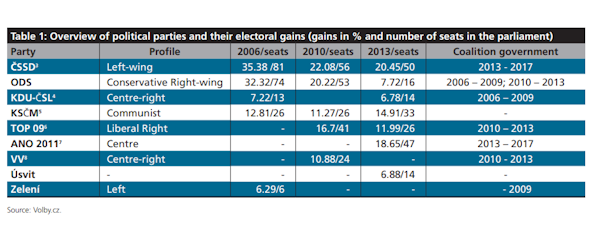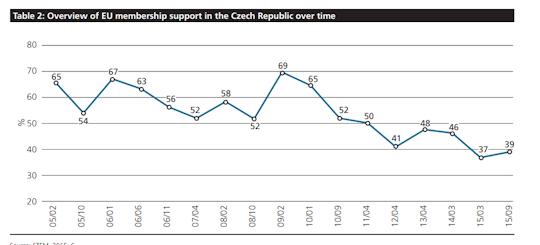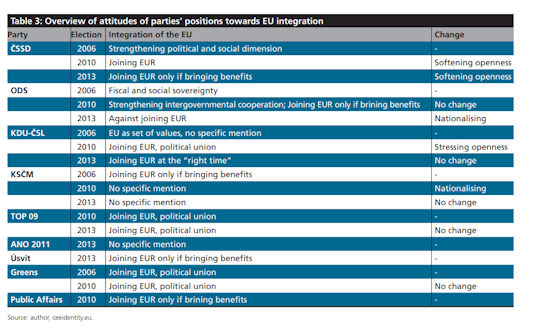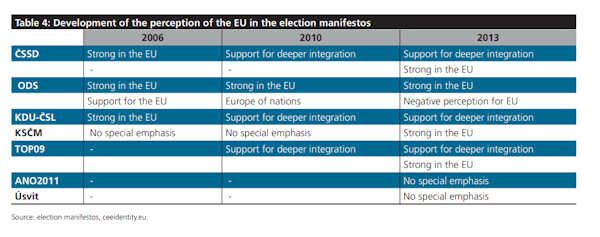Central Europe and the Rise of Nationalism: The Case of the Czech Republic

This paper deals with the broader context of political development of the V4 region over the past decade and in particular the Czech Republic in the light of the immigration crisis of 2015 and 2016. The main point is to describe the interaction between European politics, domestic politics and the perception of EU integration held by political parties in the Czech Republic. To do so, the paper understands EU membership as a space in which political parties are influenced by the norms and procedures of the EU political arena formed of the EU institutions and European political parties. National political parties are socialised into accepting the norms and procedures of this EU space, which is supportive of deeper EU integration. As a consequence, parties transform this influence into election manifestos. Therefore, the development of the interaction between European politics and domestic politics shows the lack of a new post-accession vision for the integrated EU and a broad shift from EU-supportive policies towards national-oriented ones when analysing the V4 region.
This decade has resulted in a politically emotional response to the immigrant crisis followed by negative attitudes towards the EU. The paper focuses on the political parties and their election manifestos presented for general election in the past decade (2006–2016). The main point of interest is the issue of European integration when it appears in the election manifestos. To get an up-to-date analysis of this development in the Czech Republic, analysis of EU integration is followed by analysis of the responses of political parties to the migrant crisis in 2016.
In the first part, the paper introduces the general context of the effects of the political parties participating in European politics considering the historical development since 1989. The main point of interest is the impact of the European political space on parties with emphasis on election manifestos for the past three general elections. The second part focuses on the political context of the Czech Republic in regard to European integration. The third part analyses the development of the parties’ perception of the EU as well as the recent (2016) rise of anti-EU sentiment going hand-in-hand with the anti-migrant discourse spreading in Czech politics.
The “Return to Europe” and its consequences
With entry to the EU, the Czech Republic, like the other V4 countries, enacted a so-called “Return to Europe”. The year 2004 is perceived as the time of the greatest shared enthusiasm for EU integration and, at the same time, an opportunity for political parties to broaden their influence to also cover the European level. This necessarily involves the parties’ adoption of the norms shared in the European political environment, which supports the EU integration process by definition. All V4 countries have aimed to be part of Western Europe since 1989 and therefore incorporated the norms of Western communities. Much of the process of getting closer to Europe began only after the year 2004, but it was in that year that a much more difficult process began – accepting the norms of the functions of the EU and of European politics.
For the decade after 2004 there was a drop in these positive perceptions and a shift toward the model of a daily struggle with European matters. Parties and societies in the V4 countries experience the impact of growing transnationalisation on their own and they assess the implications in regard to their electorate. The result of this process is a not always positive acceptance of the transnationalisation process in terms of effective participation in the European political space. This is demonstrated, for instance, by research published by Klingemann (2014: 123) showing that the perception of democracy as a positive value in eastern European societies did not rise significantly in the 1999 to 2009 period. Therefore, it is expected that the impact of transnationalisation on societies in the CEE region, as well as political parties, may result in deeper changes to political competition. Constant evolution of the external environment – such as the EU – is reflected not only in the form of deepening EU integration in a federalised sense. The main factor remains the ever-increasing degree of interconnectedness of the individual EU member states and their regions.
Boosting social and political expectations in the Czech Republic during the pro-EU pre-accession campaign has, in the longer term, only led in the opposite direction. Namely, the shaping of the new narrative national identity as a new member state, coping with the economic crisis and also experiencing the negative aspects of the free market and the migration crisis. In this context, historian Philipp Ther (2015) puts the European context into the reality of the past decade of the V4 region as struggling in the search for its role in the globalised Europe. This flux is thus often translated into national identity politics as a search for the easiest political solutions. Therefore, national identity-related issues – not just in the V4 – grow in significance and are used to create a new political cleavage.
EU integration as a topic for political competition
Political texts such as election manifestos provide one of the main information resources from which to gain information about political parties and their attitudes. Even if the election manifestos are not the elements shaping the pre-electoral discourse they are offering political parties more or less unlimited space for expressing their attitude within various topics and issues. Political parties are solely responsible for the content of the manifestos issued by councils of elected party elites or legally ratified by party conventions. Thus, they can be seen as authoritative statements of party preferences and represent the whole party. Furthermore, the manifestos are issued at regular intervals, therefore programmatic changes can be observed over parties’ lifetimes as well as programmatic differences at a particular point in time within specific countries. The methodology researching parties’ emphasis on EU-related issues (and in a broader use relating to the issues connected to national identity) was developed by Němčok and Vít (2016). The research is based on grounded theory as a significant methodological part of qualitative method in social sciences. The emphasis is placed on creating 70 codes that are relevant for national identity based on the research of election manifestos in V4 countries. Out of 70 codes, six are dedicated to EU integration. Speaking about EU-related issues, codes explore how the EU integration is perceived within manifestos. The purpose is to enhance the party’s attitude towards issues relating to the EU. The most crucial point is the party's position towards the deeper integration of the EU. In other words, the party’s commitment to the European idea. Usually, the manifesto does not contain a statement supporting or rejecting deeper integration. It might be collected from various mentions such as supporting joining the monetary union or the explicit mention of nationally sensitive policy such as the integration of tax policy. The domain of the EU is composed of declaratory statements as well as of its mention in various policy fields.
The starting point for the analysis of the Czech political parties is the period beginning in 2006 and the first general election after accession to the EU. Broadly, in the period after 1989 a decrease in the relevance of topics related to extremist forms of nationalism is observable. Looking at Czech parliamentary parties, a convergence of policies related to national identity occurred within the realms of the party systems. This means that all parties are exposed to the same influence within EU institutions and European politics. However, after the 2010 general election a rise in the importance of national identity and EU-related issues, in particular those relating to political competition takes place. Hand in hand with this, a number of newly founded parties operationalising national identity increases as well as parties like Public Affairs (in parliament in the 2010–2013 period) and the Dawn of Direct Democracy (Úsvit) movement (in parliament 2013–2017).
An interesting point on the rise of new political parties is made by Hanley and Sikk (2013) that “in CEE anti-establishment reform parties more often broke through in economic good times than bad”. It shows the demand for a kind of story that is in these cases promoted by new parties and often heavily politicises the issue of the EU integration, for example, as a threat to national sovereignty.
Czech politics and EU integration
The Czech Republic’s accession to the EU was perceived dominantly as opening up new opportunities for society as well as for political parties. In this context, one has to consider the high expectations of the public and political parties to support the Czech Republic’s accession with a de facto non-existent parliamentary democratic opposition against membership of the EU. Hand in hand with new treaty reform (later known as the Lisbon Treaty) opposition to strengthening the supranational substance of political integration began to form. This was the case not just of less relevant political formations, but also among government representatives such as ODS, the leading government party between 2006 and 2009. As a consequence of this, EU integration issues became an important government cleavage during the 2007–2009 centre-right coalition (ODS, KDU-ČSL, Green Party). The issue of deeper EU integration was concluded by the approval of the Lisbon Treaty in November 2009. The internal contradiction in the ODS had no impact on the creation of a possible “European cleavage” in Czech domestic policy. In light of this development, in 2009 the newly formed centre-right party TOP 09 built up its profile on strong support of the EU. Contrary to this, ODS increasingly started to define itself as defender of Czech national interests in Europe, such as opposing membership of the eurozone. From a broader perspective EU-related issues did not become one of the most significant cleavages in Czech politics. In this regard, parties’ perceptions of the EU-related issues have moved a much closer to the political centre. However, though the conservative-right party TOP 09 represents the most EU-supportive stream of Czech politics, its relevance has been falling continuously since the 2013 general election. Also evident from the overview are the rather convergent trends of parties’ policies when it comes to EU integration.

[2] Civic Democratic Party/Občanská demokratická strana, ODS.
[3] Czech Social Democratic Party/Česká strana sociálně demokratická, ČSSD.
[4] Christian and Democratic Union – Czechoslovak People's Party/Křesťanská a demokratická unie – Československá strana lidová, KDU–ČSL.
[5] Communist Party of Bohemia and Moravia/Komunistická strana Čech a Moravy, KSČM.
[6] Tradice Odpovědnost Prosperita/Tradition Responsibility Prosperity.
[7] Action of Unsatisfied Citizend 2011/Akce nespokojených občanů 2011, ANO 2011.
[8] Public Affairs/Věci veřejné, VV.
The summary of election manifestos shows the decline of perceptions supporting deeper integration moves. Looking at the mentions of eurozone membership, all parties have moved towards reluctant positions: from support for membership in the case of the social democrats (ČSSD) in 2006 and 2010 to the strict opposition of ODS (2013). In addition to this, the main scope of perceptions has also moved from economic arguments towards emotional ones – membership as a political issue rather than economic one for KDU-ČSL (2013) as well as using sovereignty arguments in the case of ODS (2013). Despite moves showing a decline in support in the case of ČSSD and KDU-ČSL, one can observe that support for eurozone membership remains significant.
Less support for EU integration despite EU membership?
In 2009 ODS decided to cease its membership of the EPP (European Peoples’ Party) and establish the ERG (European Reformist Group) a new political group in the European Parliament whose stance towards deeper integration is decidedly negative. Although at European level ODS has for a long time been represented in various institutional structures, its adjustment to European norms arising from the party's socialisation in the European environment has not been taking place. It may thus be concluded that the long-term tensions within the party in relation to the European environment that was perceived as supportive of deeper integration played a role in the transformation in the party's perception of national identity. Nevertheless, this transformation may be thought of as belonging to a wider trend – the extent to which this transformation is related to the party’s depletion of the liberal-conservative politics from the transformation period and an objective crisis of human resources in the party itself. The party's membership of a European political group with whom it does not completely share its mission is another factor in this regard. The European group does not serve as an ancillary anchor that is able to contribute towards upholding the ideological framework in relative concordance with that of the European political group. As a result, it may be concluded that party’s mission and ideology play a greater role than a sort of ad hoc identification of individual and rather haphazard political topics and their prioritisation.

In the case of the Czech political parties it is possible to observe the following tendency: with their increased involvement in the structures of the European political space, their emphasis on nationalism-coloured politics decreases. As a result, it would be fruitful to focus further research on the ideological centre, the main ideological force during the transformation period, and the ways in which it is influenced by relevant developments in this regard, such as the challenge presented by the immigration wave of 2015.

Between the years 2012 and 2013 the Tomio Okamura phenomenon emerged. For the 2013 parliamentary elections, he set up the Úsvit movement whose political campaign was concerned with the question of socially excluded localities with a negative emphasis on the Roma population to exclude them (socially) from the majority society. The party won 7.3% in the elections and continued to intensively pursue the thematisation of the Roma issue even in parliament. The party also intensively focused on the negative definition of globalisation, the EU and the occasional support of conspiracy theories until its demise. Despite the fact that the movement fell apart in the first half of 2015 due to disputes about party finances, it showed the rise in the use of anti-EU sentiments among relevant (parliamentary) political parties. This successful shift of a primarily positive EU understanding culminated in 2015 during the peak of the migrant crisis when anti-EU rhetoric was used by most of the parliamentary parties. It also has to be mentioned that the Úsvit movement (later called the SPD under the leadership of Tomio Okamura) did not have any significant political cooperation at EU level as well as having no aspiration for such cooperation.

The whole range of national identity relevant issues such as sovereignty, culture and external threats have been rising in the period since the last general election in 2013. However, national identity in its extreme form in terms of far-right-wing parties in Czech politics is not stepping into the political mainstream in terms of significant electoral success unlike in Slovakia or Hungary. Although there have been parties such as Úsvit and KSČM playing the national identity card in their demonstrations, its use does not cause a significant rise in the emphasis on national identity in its extreme form, such as violence against minorities or immigrants. The following section covers the most relevant issues regarding how features of national identity are reflected in Czech politics. The entry of the ANO and the Úsvit political movements to the political scene has caused a significant shift in the handling of the issue of EU integration. Úsvit (Tomio Okamura) has thematised this issue intensely. From the perspective of strategic, purposive and instrumental use of anti-EU and, subsequently, national identity feelings, it is expected to focus on the ideological centre of the party system.
Anti-immigrant sentiments in the context of Czech EU policy
The rise of anti-immigrant sentiments in 2015 and 2016 has much broader roots than just a single policy issue that has affected Czech politics as shown by the contrast with the support for EU integration. It also shows how the issue of the immigrant crisis sped up a process of weakening the shared EU-supporting narrative. Therefore, the immigrant issue is a tool for getting attention instead of a thought-through policy. This is also supported by the fact that none of the parties stressing anti-immigrant policy have long proven track records of anti-immigrant policies. The background can be therefore divided into the following parts: lack of deep-rooted penetration of the EU narrative among the Czech political parties; a changing European environment that gives weaker transformative power to the political parties; and generational change within Czech politics.
A deeper perspective is offered by analysis of party manifestos for the regional elections that took place in October 2016. Despite the fact that regional councils have very limited competence when it comes to EU policy on the Czech Republic, the issue of EU integration was used very extensively, as well as immigrant issue. As the overview of parties below shows (the most relevant ones) almost all parties have been opposed to accepting shared responsibility for coping with refugees. Even parties supporting a quota system have shifted their policies to a position of reluctance (KDU-ČSL) or even opposition (TOP 09). This example shows how an issue that is totally outside the competence of regions has heavily influenced the election campaign and even allowed the anti-EU, anti-immigrant party SPD/SPO to enter 10 of the 13 regional councils. Despite this, there has been no significant extremist political movement in Czech politics of significance in the past decade. Nevertheless, the significant shift from EU supporting attitudes towards EU reluctance or even firm opposition shows much broader developments and shifts in Czech politics.

Analysing the political parties, it has to be also said that the attractiveness of the EU narrative has declined significantly. Instead of the expected deepening of supranational EU integration, the EU representatives and national representatives are trying to keep the EU together. In this context, it cannot be expected that political parties will invest any energy in rescuing the EU integration process if they are not thought to contribute to developing the shared narrative. It is a paradox that the Czech Republic has the EU’s lowest unemployment rate and yet the population’s dissatisfaction with the EU in general and even with EU membership grows constantly.
Conclusion
The generation of representatives of political parties that brought the Czech Republic into the EU is mostly gone. This generation was replaced by a more pragmatic, less visionary generation administrating the country instead of building it or even bringing it back towards Europe. Hand in hand with missing rooted support of the EU narrative in the Czech politics and society, the EU is treated as something granted. Current representatives are less motivated to search for partners beyond their home countries and cultivate long-term relationships in order to get their support as was the case in the accession period. What does it mean for the current political context? The immigrant crisis shows the much broader consequences of the political development of the Czech Republic. It shows that the use of national identity coloured politics is again a politically relevant tool not only for extreme right parties but even for mainstream parties. Since there is no broader narrative of belonging to the EU this will not change any time soon.
References
HANLEY, Sean and SIKK, Allan. “Economy, Corruption or Promiscuous Voters? Explaining the Success of Anti-Establishment Reform Parties in Eastern Europe”. COMPASSS WP Series, 2013, pp. 51-75.
KLINGENMANN, Hans.-Dieter. (ed.) Democracy and political culture in eastern Europe. London: Routledge, 2006.
NEMČOK, Miroslav and VÍT, Michal. “Attitudes towards nationalism and European integration: Are political parties behaving consistently in the European arena and within the nation state?” Manuscript, 2016.
THER, Philipp. Nový pořádek na starém kontinentě. Praha: Libri, 2015.